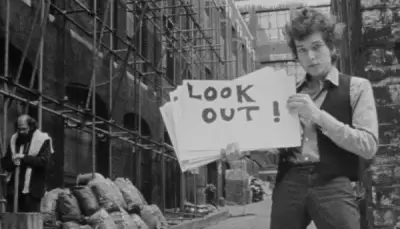Film Love brings hard-to-see movies to a big screen

Dont Look Back by DA Pennebaker Photo courtesy of Pennebaker Hegedus Films Credit Pennebaker Hegedus Films On July D A Pennebaker s Don t Look Back a groundbreaking documentary about Bob Dylan will play at the Plaza Theatre The movie is screened through Film Love a film series that brings rarely seen avant garde and experimental films to the constituents Andy Ditzler has been curating the Film Love series for over years The series started in when Ditzler was looking for a copy of a movie and couldn t find it in video stores Turns out the only way to screen the film was with a projector I had to find particular projectors I had to find people who knew what they were doing I had to spend specific money renting the prints Ditzler mentioned I revealed if I m going to go through all that I m not going to project these in my living room Let s show them because there will perhaps be a meager other people interested According to Ditzler that first iteration of Film Love attracted over people all packed into the Eyedrum Art and Music Gallery watching s Beat generation movies From there Film Love took off with Ditzler showing films like Empire Andy Warhol s eight-hour underground documentary featuring footage of the Empire State Building Jaguar the ethnographic film from French filmmaker and anthropologist Jean Rouch and numerous other experimental and underground films at different venues all over Atlanta Often I was having to take a micro cinema around in my van show up and basically convert whatever space I had access into a cinema for the evening Ditzler mentioned Whereas the Plaza is already set up for this so that s a great thing Don t Look Back is presented as part of an ongoing series of films that Ditzler is hosting at the Plaza The film directed by the pioneering documentary filmmaker D A Pennebaker follows Bob Dylan on his concert tour in England right around the time he was toying with the idea of going electric The film isn t as hard to see as several of the other films Ditzler has screened over the years but he knows the experience of viewing the movie on a big screen will be far different from that of watching it at home It s a fascinating document of Dylan he noted I m not sure really that he allowed a movie maker to get that close to him ever again In addition to its fascinating subject Ditzler chose Don t Look Back because of what it meant for the art of filmmaking Pennebaker was one of the pioneers of cin ma v rit a style of documentary filmmaking where a camera crew would follow a subject and try to capture real events as truthfully as feasible think of a fly on the wall He was also a contemporary of Robert Drew a filmmaker who pioneered the advent of using lightweight mm cameras and sound recorders to sync sound in film Drew s film Primary which followed John F Kennedy on the campaign trail and which Pennebaker worked as one of multiple cinematographers was the first in which this technique was used allowing the camera to follow and get up close and personal with its subject Using this same technique Pennebaker was able to capture as intimate a portrait as viable of Dylan on tour That is a technological revolution that leads to an aesthetic revolution in filmmaking Ditzler stated Don t Look Back is one of the more accessible films that Ditzler has shown but for Ditzler access can mean a lot of different things In the streaming era it s easy to feel like the entirety of film history is available to you at the click of a button But dig a little deeper and you ll realize that movies are dependably disappearing from different services or preserved in formats that don t capture the magic of how they re supposed to look If this is true for old Hollywood films it s doubly true for the experimental set that Ditzler wants to highlight Experimental film history and avant garde history have to be among the least profitable sort of enterprises Ditzler announced That includes the digitization of it in a good enough copy to do it justice For Ditzler the question of access doesn t just mean Is the film readily available It also means What is the way that this was meant to be seen Right now you can watch Wavelength an experimental film from the Canadian artist Michael Snow on YouTube But does that accessibility necessarily equal value Because you can click on a button and see Michael Snow s Wavelength on YouTube doesn t mean that you re getting anything of value about Wavelength at all Ditzler announced It looks crappy Then you scroll down and read comment after comment about This is nonsense why are you making me watch this and so forth It s all just very depressing With Film Love Ditzler aims to project these works in the best way accomplishable so that when audiences see something like Wavelength they understand something intrinsic about the work that can t be understood by seeing it any other way The audience experience means a lot to Ditzler after all Film Love arose out of his own desire to watch these movies As much as he is a curator Ditzler still considers himself part of the audience Curation takes more than a modicum of expertise but Ditzler is more interested in curation as a community-focused activity He helps the audience by getting them excited about the film through his own enthusiasm teaching them how to watch experimental and avant garde films and helping them sift through their own thoughts about the film in a discussion afterwards All of that speaks to this idea that cinema is capable of creating a locality Ditzler announced It s capable of creating a group grounded in the experience of projected light onto a screen that is ephemeral The post Film Love brings hard-to-see movies to a big screen appeared first on Rough Draft Atlanta

